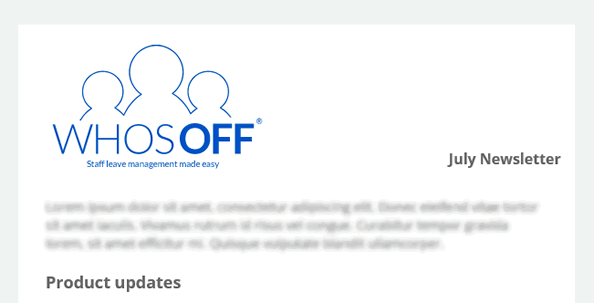As a child, there’s nothing more exciting than getting a day off school when it snows. But snow days are much more inconvenient for adults.
Deadlines don’t stop because you can’t travel to your place of work, and some people can’t do their job from home. Does this mean you and your colleagues need to take snow days from your annual leave entitlement?
WhosOff has put together some useful information on managing staff snow days. Here are our key insights for employers and employees:
Do employees have the right to work from home on a snow day?
When and where staff work should be set out in their contract. A clear working-from-home policy sets expectations and cuts down on employee questions.
However, it’s worth reviewing your policy in extreme weather conditions. You have a duty of care to your team, which is equally important as their contractual obligations.
As an employer, if snow has been forecast, consider if it will be safe for your staff to travel to work. A light flurry won’t cause much disruption. But do you really want people trying to travel when roads are impassable?
The UK’s Advisory, Conciliation and Arbitration Service (Acas) encourages businesses to plan ahead for snow days, by:
- Keeping in contact with staff to update them on working arrangements
- Allowing remote working (if appropriate)
- Helping staff to plan safe journeys if they need to come to work
- Arranging cover for emergency/necessary work if staff can’t travel in
- Notifying customers if the weather will cause delays to products/services
When bad weather is forecast, email employees with your expectations. This prevents unnecessary journeys – and staff can take home essential resources.
Employees: don’t assume that snowfall gives you the right to work from home. Always check with your employer whether they expect you to travel to work.
Do employers have to pay employees for snow days?
If you can't work from home and your workplace remains open, you may not be entitled to paid time off. Employers don’t have to pay employees for snow days.
However, some companies have ‘adverse weather’ policies that allow paid time off. For example, you may still get paid if your work closes because working conditions are unsafe.
If your workplace is open but you don't want to travel, make alternative arrangements with your employer. These could include:
- Working from home until the weather improves
- Adapting your hours to make travel safer – e.g. finishing earlier than usual so you don’t have to drive home in the dark
- Working from a different location/premises that’s easier to access
- Getting to work via a different mode of transport (e.g. walking rather than driving)
The other option is to use your annual leave on snow days. This allows you to stay at home and still get paid. Plus, you can go outside and enjoy the snow rather than having to work!
Can employers force staff to take snow days as holiday?
Using annual leave to cover snow days is a difficult subject matter. It depends on how disruptive the weather is, whether it's expected, and how long it lasts.
Employers have the right to request staff take time off if they provide enough notice. In the UK, businesses need to give twice as much notice as the amount of time taken. A company could warn staff two days beforehand that they’ll need to book leave if they want them to take one day off due to snow.
Before setting hard-and-fast rules, employers should consider the impact of blanket instructions. They could create questions and complaints, such as:
- Is it fair if some staff can work from home but others must book snow days as annual leave?
- What happens if an employee has already used up their holiday entitlement for the year?
- What happens if staff can’t get to work due to a situation beyond their control? For example, cancelled trains or caring for children whose school/nursery is closed.
It’s also worth considering the impact on employees who are already on holiday. What happens if they can’t return home due to snow disruption? For more on this subject, read: are employees entitled to change their holiday if their flight gets cancelled?
Make sure you track who books time off due to snow so your annual leave planner is up to date.
How can companies minimise snow day disruption?
We’ve mentioned the importance of logging any paid leave people take to cover snow days. But there’s so much more your company can do to minimise snow disruption. For example:
1. Set clear policies on where employees can work, including during adverse weather. Clear guidelines make it easier to manage snow days and reduce the number of staff questions.
2. When snow hits, log and share who’s working from home during adverse weather versus who is taking time off. If someone’s using their annual leave, they have a right not to deal with work matters. But if they’re working from home, they should be available to discuss tasks and answer queries.
3. If you decide to shut down your premises and give everyone the day off, record this information. When you look back on staff absences, you can see it was an all-company snow day. Not an individual sick day or unauthorised absence.
4. Document snow day communications, including employee questions or concerns. This will help you to develop policies and processes for future extreme weather.
You may struggle to record this level of detail if you’re managing leave through a spreadsheet. Many companies are switching to an online staff holiday tracker like WhosOff to track why people take time off.

WhosOff documents information like who’s working from home alongside staff holiday bookings. You can even create custom categories such as snow days for future analysis.
Interested in trying our staff holiday tracker? Start your free WhosOff trial today and pay nothing for the rest of this month and all of next month.
Photo by Steven Wright of Unsplash.com, and Simon Matzinger of Pexels.com
Similar articles
10.APR.2025
As a business owner, HR manager, or professional responsible for managing a team, one of the key tasks you will face is understanding and planning for the number of working days in a year and working weeks in a year. Using an online leave management tool such as WhosOff can relieve some of this burden.
01.APR.2025
As the new financial year begins, businesses are gearing up to streamline operations, optimize resources, and ensure smooth workflows. One critical aspect of this preparation is managing staff leave effectively, here's where WhosOff can help.
28.JAN.2025
As a fundamental part of any business running smoothly, the management and tracking of staff leave is often a task that can be overlooked but can have a major impact on operations when things go wrong.
16.OCT.2024
Learn how our customers have accelerated their internal business processes by integrating with the WhosOff API to manage their staff leave and absence tasks.


